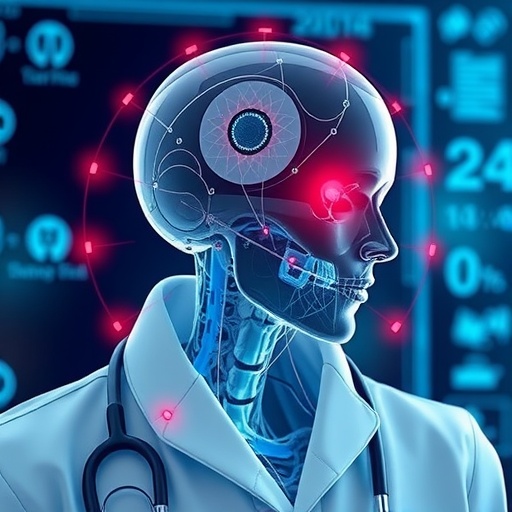In recent years, the integration of Artificial Intelligence (AI) technologies into the healthcare sector has moved from theoretical discussions to practical applications, notably in the realm of medical documentation. A significant step forward has been made in the internal medicine residency programs, where a groundbreaking study highlights the use of Ambient AI Scribe Technology. This remarkable advancement promises to transform the way medical practitioners manage clinical interactions and documentation, streamlining processes that are often burdensome and time-consuming.
The primary aim of this innovative technology is to alleviate the documentation load that heavily weighs on the shoulders of healthcare professionals. Traditionally, physicians spend a considerable amount of their time on administrative tasks, often sacrificing invaluable face-to-face time with their patients. The Ambient AI Scribe Technology is poised to change this narrative by autonomously capturing and transcribing conversations during patient encounters, allowing healthcare providers to refocus their energies on patient care.
In their pivotal study, Chen et al. underscore the technology’s capabilities in real-world applications within internal medicine residency clinics. This research meticulously details the deployment of AI scribes that operate in the background, processing natural language in real-time. By utilizing advanced machine learning algorithms, these AI systems are trained to comprehend medical terminology and context, facilitating accurate documentation that adheres to professional healthcare standards.
One of the standout features of the Ambient AI Scribe is its ability to function seamlessly alongside healthcare professionals. It listens attentively to the clinician-patient dialogue, understanding nuances and complexities in language that are often specific to medical conversations. This not only enhances the accuracy of the notes generated but also ensures that the emotional and psychological aspects of patient interaction are documented effectively.
Another critical aspect of the study highlights the potential cost-effectiveness of deploying AI scribe technology within residency programs. By offloading documentation tasks to AI, healthcare institutions could see a reduction in the need for administrative personnel, thereby reallocating financial resources toward enhancing patient care and education. Furthermore, this technology empowers resident physicians by allowing them to invest more time in direct patient interaction, thereby enriching their training and improving patient outcomes.
Nonetheless, the adoption of AI in clinical environments does not come without challenges. The study meticulously discusses potential concerns regarding data privacy and ethical implications inherent in AI deployment. As these systems operate by capturing sensitive patient conversations, adherence to strict data protection regulations is paramount. Ensuring transparency in how data is used and processed establishes trust and fosters a positive relationship between patients and the healthcare system.
Additionally, the human-AI collaboration aspect warrants consideration. While AI can handle an array of tasks efficiently, the nuances of human interaction remain irreplaceable. Clinicians must navigate complex emotional landscapes and make empathetic connections, tasks that AI cannot perform. The study posits that rather than replacing the human element, Ambient AI Scribe functions as an augmentation of clinical skills, allowing physicians to provide more personalized care.
In trials conducted within the residency program, feedback from participants was largely positive. Residents noted reduced stress levels associated with documentation and reported enhanced ability to engage with patients. The qualitative data gathered suggests that with the cognitive load lightened, both physician satisfaction and patient satisfaction scores have improved significantly. This correlation highlights the profound impact that efficient documentation processes can have on overall healthcare delivery.
Further research is encouraged to explore the long-term impact of AI scribes on clinical outcomes and education within internal medicine residency programs. Understanding how this technology influences not just efficiency but also the quality of care given to patients is crucial. It allows for a more comprehensive assessment of how AI integration can best serve medical professions and ultimately benefit patients.
As we move into an era dominated by technology, it’s clear that the marriage of AI and healthcare is inexorable. The implications of studies such as those conducted by Chen et al. resonate beyond mere convenience. They signal a paradigm shift in how medical education and practice can be redefined. By incorporating AI scribes into their workflows, healthcare professionals may very well become ambassadors of a transformed medical landscape where technology fosters, rather than hinders, the art of healing.
Innovation in medical technology is essential not only for the practitioners but for the patients they serve. Advancements that improve efficiency and enhance interpersonal relationships are paramount to fostering a healthier society. The pathway forward is clear: embracing Ambient AI Scribe Technology could serve as a catalyst for profound change in internal medicine and beyond.
In conclusion, the integration of AI into the medical documentation process, particularly through Ambient AI Scribe Technology, represents a significant evolution in internal medicine residency programs. As further studies are conducted and technologies refined, it is not only the technical aspects of healthcare that will improve but also the quality of patient care and the satisfaction of medical professionals. This cycle of improvement, driven by innovation, stands to redefine the future of clinical medicine in substantial and meaningful ways.
Subject of Research: Integration of Ambient AI Scribe Technology in Internal Medicine Residency Clinic
Article Title: Noteworthy – Integration of Ambient AI Scribe Technology in Internal Medicine Residency Clinic
Article References: Chen, J.L., Tran, H.N., Brickner, L.A. et al. Noteworthy – Integration of Ambient AI Scribe Technology in Internal Medicine Residency Clinic. J GEN INTERN MED (2025). https://doi.org/10.1007/s11606-025-09932-6
Image Credits: AI Generated
DOI: https://doi.org/10.1007/s11606-025-09932-6
Keywords: AI technology, Ambient AI Scribe, internal medicine, residency programs, healthcare documentation, patient care, medical education, machine learning, data privacy, healthcare technology.




